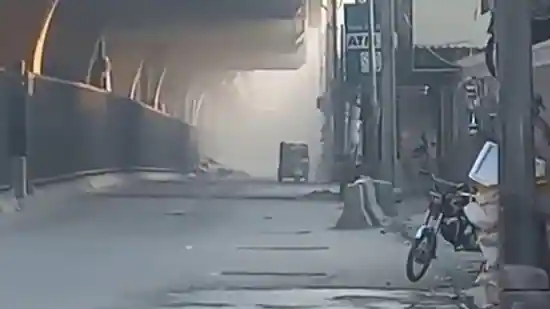Deadly Attack Targets Frontier Constabulary Headquarters in Peshawar
By: Javid Amin | 23 November 2025
On Monday morning (November 24, 2025), gunmen launched an assault on the headquarters of the Frontier Constabulary (FC) in Peshawar, northwest Pakistan, according to senior police officials and multiple news agencies. Reuters+2The Economic Times+2
The compound, located in a densely built area near a military cantonment, was also reportedly struck by two suicide bombers; one detonated at the main entrance and another penetrated into the facility. The Economic Times+1
At least three people, including security personnel, have died in the attack; the death toll may rise as the situation remains fluid. Reuters
Incident and Immediate Response
-
According to a senior official who spoke to Reuters on condition of anonymity, “the first suicide bomber carried out an attack on the main entrance of the constabulary and the other one entered the compound.” Reuters+1
-
Residents in the area reported hearing two blasts followed by heavy gunfire. Social-media posts from the zone indicated both explosions and the sound of automatic weapons. The Indian Express+1
-
Law-enforcement personnel from the Pakistan Army and local police quickly cordoned off the area, closed roads leading into the compound, and launched clearance operations in the vicinity. The Straits Times+1
Why the Location Matters
The FC headquarters in Peshawar is a strategic security installation. Its proximity to a military cantonment, high-security infrastructure and dense civilian zones makes any breach or attack especially significant from a counter-terrorism standpoint. Attacks on such facilities tend to have wide psychological, operational and symbolic effects.
This assault comes amid a pattern of militant attacks targeting Pakistani security and paramilitary formations, particularly in the province of Khyber Pakhtunkhwa (KP) and border-adjacent areas.
Broader Implications
Operational impact: The attack highlights the continuing vulnerability of even high-security compounds to coordinated assaults combining explosives and armed infiltration.
Security messaging: Militants striking such targets aim for maximum visibility. A successful attack on a paramilitary HQ can shake public confidence in security agencies and impose heavy resource and morale burdens.
Political dimension: Islamabad will likely face pressure to demonstrate rapid response, accountability, and preventive upgrades—both to domestic audiences and international partners.
Regional dimension: Peshawar, as a city near Afghanistan and historically contested by militant networks, remains a flash-point for cross-border and domestic insurgent activity. This incident may influence Pakistan’s counter-insurgency posture and ties with neighbouring states.
What We Still Don’t Know
-
The identity of the attackers has not been officially confirmed.
-
The full number of casualties (dead and wounded) remains uncertain and may increase.
-
The extent of damage inside the compound is not fully clear.
-
Whether any additional attackers remain inside the complex is being actively investigated. The Economic Times
-
Which militant group planned or supported this operation; no claim-of-responsibility has yet been verified.
Immediate Next Steps & Outlook
-
Clearance operations: Security forces will sweep the compound for remaining threats, booby-traps and coordinate forensic recovery.
-
Investigation: Intelligence agencies will analyse CCTV, detonation patterns, entry routes and weapon load-outs to identify networks.
-
Public communication: The provincial government and federal Interior Ministry will likely issue statements referencing the attack, and may announce compensations for victims.
-
Security audit: Pakistan may reinforce security at similar installations, review protocols, and heighten alert levels across KP province.
-
Diplomatic signalling: Given Pakistan’s international commitments to counter-terrorism, Islamabad may seek to emphasise its response to global partners and aid agencies.
Conclusion
The attack on Pakistan’s Frontier Constabulary headquarters in Peshawar reflects the enduring challenge of militant violence in the region. While the immediate casualties and disruption are grave, the broader implications—of symbolism, security architecture, public confidence and regional stability—are profound. As the authorities mobilise to respond, the critical question is whether this event triggers structural reforms, intelligence breakthroughs and sustainable deterrence—or simply becomes another tragic entry in the ongoing insurgency ledger.
For now, the city remains in lockdown, investigations are under way, and Pakistan’s security apparatus faces another test of resilience.




